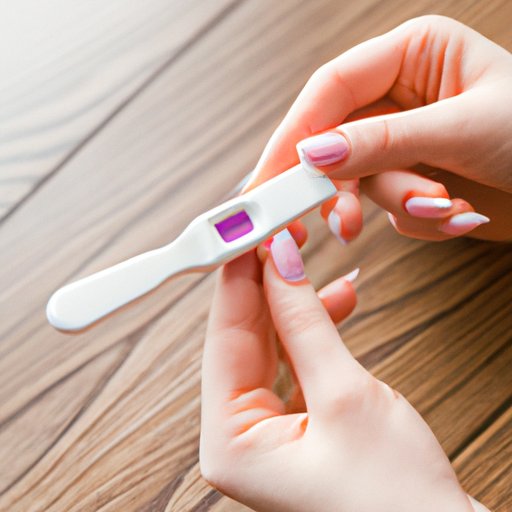
Introduction
Discovering that you are pregnant can be an incredibly exciting but scary time. Recognizing the early signs of pregnancy is essential so you can begin to take care of yourself and the developing fetus. This article will cover the common signs and symptoms of pregnancy, types of pregnancy tests available, early pregnancy detection, the importance of regular check-ups and visits to the doctor during pregnancy, and early signs of pregnancy in specific cases, such as PCOS and in-vitro fertilization.
Common Signs and Symptoms of Pregnancy
The most basic sign of pregnancy is a missed or late period. However, there are other common symptoms, such as fatigue, morning sickness, and breast tenderness, that could suggest you are pregnant. These symptoms can also be indicative of other conditions, so it’s vital to keep track of them and monitor any changes in your body. Frequent urination and food aversions can also be signs of pregnancy.
Types of Pregnancy Tests
Two types of pregnancy tests are available: home urine tests and blood tests at the doctor’s office. Urine tests are more common and more convenient, while blood tests are more accurate and can detect pregnancy earlier than a urine test. Proper usage and interpretation of these tests are essential to obtain accurate results.
Early Pregnancy Detection
Early detection of pregnancy can be challenging, and taking a test too early can lead to incorrect results. At-home pregnancy tests may not detect pregnancy until after a missed period. The best time to take a pregnancy test is one week after missing a period, which will provide more accurate results. However, some women may experience false negative or positive test results, so it’s best to consult a doctor if any doubt exists.
The Importance of Regular Check-ups and Visits to the Doctor During Pregnancy
Prenatal care is essential to monitor the health and development of the baby. Regular visits to the doctor during pregnancy can detect any potential problems that may arise, such as gestational diabetes or preeclampsia, while also providing a wealth of information on how to take care of the baby during the pregnancy.
Early Signs of Pregnancy in Specific Cases
In-vitro fertilization (IVF) can make it harder to detect pregnancy symptoms. However, some early symptoms like mild spotting or brief cramping could indicate pregnancy. Additionally, women with polycystic ovary syndrome (PCOS) may find it challenging to detect early pregnancy symptoms due to irregular periods. However, tracking basal body temperature and observing any unusual changes in the body can aid in detecting pregnancy.
Conclusion
Knowing the signs of pregnancy is crucial, and recognizing them as early as possible can help ensure that both the mother and baby remain healthy. By taking the time to learn about these signs and symptoms, women can embark on a fulfilling pregnancy journey with confidence and care. Remember, a healthcare provider is always available to help throughout the pregnancy.




